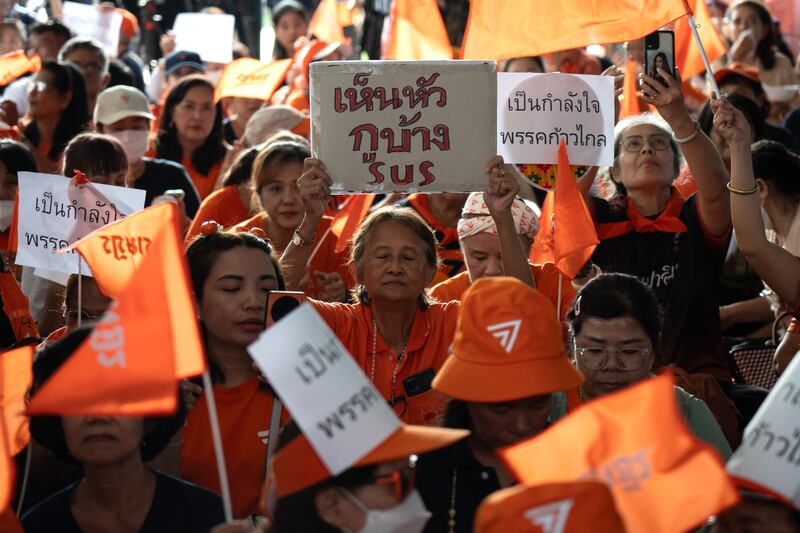UPDATED at 3:45 p.m. ET on 2024-08-07
Thailand’s Constitutional Court on Wednesday ordered the progressive Move Forward Party disbanded and banned its top leaders from politics for 10 years over promises it made during the 2023 electoral campaign to abolish the country’s strict royal defamation law.
The court’s unanimous verdict dealt another blow to supporters of Thailand’s pro-democracy movement by breaking up the party that controls 147 parliamentary seats – the biggest bloc in the legislature.
In its verdict, the court said it was dissolving the party on the grounds that Move Forward had committed treason by campaigning to scrap the royal defamation law.
“The respondent’s actions in proposing amendments to Article 112 of the Criminal Code and using it as a party policy in the election campaign, by exploiting the monarchy to gain votes and win the election, aim to place the monarchy in a position of conflict with the people,” according to the verdict.
The party intended to “erode and undermine the monarchy or weaken it, leading to the overthrow of the democratic regime under monarchy,” it went on to say.
“The Constitutional Court must therefore order the dissolution of the respondent party as prescribed by law,” the court ruled.
Move Forward had won the biggest share of seats in last year's general election, but its then-leader, Pita Limjaroenrat, was blocked by military-aligned lawmakers from becoming prime minister.
Pita and current party leader Chaithawat Tulathon were among the 11 members of Move Forward’s executive committee who were banned from politics for 10 years via Wednesday’s court ruling.
Last September, a civilian-led coalition with ties to the military came to power in Move Forward’s place.
The party had campaigned with a pledge to jettison the so-called lèse-majesté law, Article 112 of Thailand’s criminal code that shields the monarchy from criticism and defamation.
The law has been widely used to crack down on and arrest young activists and leaders of a pro-democracy movement who spearheaded massive anti-junta street protests in 2020, when a government with deep military ties was in power at the height of the COVID-19 pandemic.
Four years ago, the Constitutional Court also disbanded Move Forward's predecessor, Future Forward, and banned the leader of that other progressive party from politics for a decade over a campaign loan issue. The 2020 ruling ignited the youth-led protests that called for sweeping democratic reforms, including changes to the lèse-majesté law.
Pita, Move Forward’s former leader, addressed the party’s supporters in the early evening after the verdict was handed down.
“Although I must bid farewell as a politician and a member of parliament, and that chapter of my journey has ended, I will begin engaging in politics as a citizen,” he said.
“We will move past this. We will not let the frustration, anger, and energy we have now consume us. Instead, we will channel it and explode it in every voting booth in all future elections,” Pita said.
Chaithawat, the party’s current leader, also spoke out.
“Today’s ruling sets a dangerous precedent in interpreting the constitution and laws. It risks affecting the fundamental principles and basic values that should exist in our democratic regime with monarchy in the future,” he said.
The court’s verdict drew criticism from abroad.
The United Nations on Wednesday criticized the ruling as a “setback” for Thai democracy.
The Office of the U.N. High Commissioner for Human Rights expressed “deep regret regarding the decision,” Farhan Haq, deputy spokesman for the U.N. Secretary-General, according to the newswire agency Agence-France Presse.
“It's a setback to pluralism and democracy in Thailand and fundamental freedoms of association and expression,” Haq added.
The United States said it was deeply concerned by Wednesday’s court ruling.
"This decision disenfranchises the more than 14 million Thais who voted for the Move Forward Party in the May 2023 election and raises questions about their representation within Thailand's electoral system," said Matthew Miller, the U.S. State Department spokesman, in a statement.
“The United States does not take a position in support of any political party, but as a close ally and friend with deep and enduring ties, we urge Thailand to take actions to ensure fully inclusive political participation, and to protect democracy and the freedoms of association and expression,” he added.

At the party’s headquarters in Bangkok and the street in front of the building, hundreds of Move Forward supporters who wore orange clothes and held up party flags and signs had gathered to watch the verdict broadcast live via monitors.
Akkarawut Phumchuea, a 39-year-old company employee and party supporter who was on hand, said the decision to dissolve the party was not beyond expectation.
“Listening to the court’s reasoning, it feels illogical. We are disappointed and hopeless with the explanation. In truth, we’ve lost faith in the justice process for a long time,” he told BenarNews, adding he would keep supporting the values espoused by the now-dissolved party.
Petitions before court
The court, in its verdict Wednesday, ruled on a pair of complaints lodged against Move Forward over the party’s campaign promise to do away with Article 112.
Previously, the Constitutional Court accepted a petition from Teerayut Suwankesorn, a former lawyer for former monk Suwit Thongprasert (better known as Buddha Issara), an ultra-royalist and a key leader of the People’s Democratic Reform Committee (PDRC).
He petitioned the court to rule on whether the party’s use of the Article 112 abolition issue in its election campaign constituted an attempt to topple the government under the monarchy.
On Jan. 31, 2024, the Constitutional Court ruled that campaigning to abolish Article 112 amounted to an attempt to overthrow the government. The court prohibited any future campaigns or expressions of opinion on this matter.
Consequently, on March 18, 2024, the Election Commission (EC) submitted a petition to the Constitutional Court seeking a ruling to dissolve the Move Forward Party based on these circumstances.
In an interview on Wednesday morning, Prime Minister Srettha Thavisin declined to comment on the Move Forward Party case, despite stating a day earlier that the government had no right to interfere with the country’s courts.
He had previously said that Thailand’s judicial process was neutral, internationally recognized, and accepted by all parties.
“Personally, I respect the judicial process. In my own case regarding my eligibility to serve as Prime Minister, if there are complaints, they must be submitted to the justice system for a decision. Our country is independent, and we must respect that,” Srettha stated at Government House on Tuesday.

During a post-electoral impasse in 2023, and due to a constitutional provision granting 250 junta-appointed senators the power to vote for prime minister, Pita failed to secure the legislature’s approval to be elected PM.
That led to Pheu Thai, the second-largest party which had won 141 parliamentary seats, taking over the process to form a government. Move Forward was excluded from the coalition as other parties claimed they could not work with a party proposing to abolish Article 112.
After Wednesday’s ruling, Move Forward’s 147 current MPs will have 60 days to join new parties to retain their parliamentary seats. It remains unclear where these MPs might go or if party leaders will form a new party.
RELATED STORIES
[ Thai court accepts case seeking to disband Move Forward PartyOpens in new window ]
[ Thailand Election Commission petitions court to disband Move Forward PartyOpens in new window ]
[ Thai court orders election-winning Move Forward to halt royal insult law reformOpens in new window ]
[ Thailand’s top opposition parties agree to join forces after big electoral winOpens in new window ]
Thailand has a history of political parties being dissolved.
In 2007, the Thai Rak Thai Party, led by former Prime Minister Thaksin Shinawatra, was ordered dissolved by the Constitutional Court for actions deemed as potentially inciting the overthrow of the government.
This led some members to form the People’s Power Party, which was later also dissolved, eventually resulting in the creation of the current Pheu Thai Party.
Since 2007, at least 17 political parties have been dissolved by court order.
In the months leading up to the court’s decision on Wednesday, the case against Move Forward had reignited a debate about the delicate balance between protecting the monarchy and upholding democratic freedoms in Thailand.
The Move Forward Party’s progressive policies struck a chord with younger Thai voters in particular, but these were fiercely opposed by the military-backed parties and royalists that have long dominated Thai politics.
“I believe this verdict will harm Thai society for a long time, hurting future generations, including the children of those who made this decision,” Associate Professor Somchai Preecha-silpakul, a lecturer and former dean of the law faculty at Chiang Mai University, told BenarNews.
“Thai society has been through enough difficult situations. It’s time to try to push Thai society back to genuine democratic debate.”
In his opinion, the key issue is Article 112.
“Whether we agree with it or not, when the legislative branch proposes to debate it, it should be open for discussion. It’s not right to silence those who dare to touch Article 112 by dissolving their party. This action is highly problematic.”
Wanna Tamthong in Chiang Mai contributed to this report. This report has been updated to include the reaction of the U.S. State Department.
